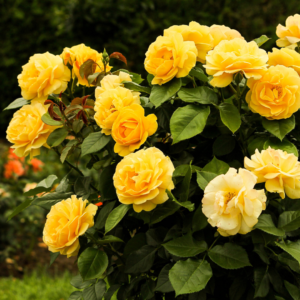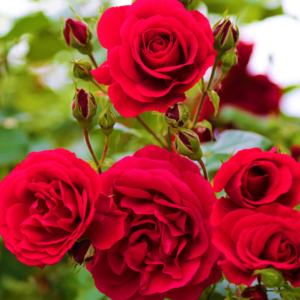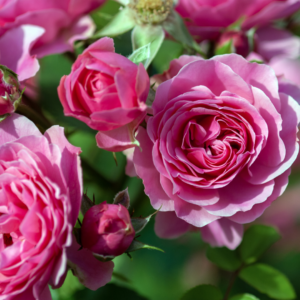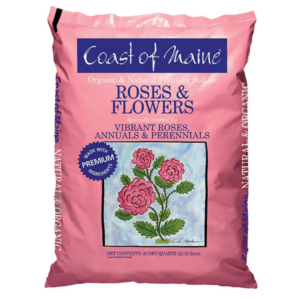 Roses are one of the most beloved flowers in the world, known for their beauty, fragrance, and symbolism. However, growing and maintaining roses requires proper care to ensure they thrive. Oftentimes people think that growing beautiful roses requires using synthetic pesticides and fertilizer. In fact, there are Organic products that will help to keep your roses healthy, and your garden and soil happy too!
Roses are one of the most beloved flowers in the world, known for their beauty, fragrance, and symbolism. However, growing and maintaining roses requires proper care to ensure they thrive. Oftentimes people think that growing beautiful roses requires using synthetic pesticides and fertilizer. In fact, there are Organic products that will help to keep your roses healthy, and your garden and soil happy too!
Whether you’re a beginner or an experienced gardener, these tips will help you cultivate healthy, vibrant roses in your garden and home…Organically!
Choosing the Right Roses
Before planting, it’s important to select the right type of rose for your climate and garden conditions. Some popular types include:
- Hybrid Teas – Classic long-stemmed roses with a single bloom per stem.
- Floribundas – Bushy roses with clusters of blooms, ideal for garden beds.
- Grandifloras – A mix of hybrid teas and floribundas, producing large blooms in clusters.
- Climbing Roses – Best for trellises and fences, producing long, arching canes.
- Shrub Roses – Hardy and disease-resistant, great for low-maintenance gardens.
 When to Plant
When to Plant
- Bare-root roses: Best planted in early spring or late fall when they are dormant.
- Potted roses: Can be planted at any time of the year, but spring and fall are ideal.
Where to Plant
- Sunlight: Roses need at least 6–8 hours of direct sunlight daily.
- Soil: Well-draining soil rich in organic matter is ideal. A pH level between 6.0 and 6.5 is best.
- Spacing: Allow enough room between plants (2–3 feet for most varieties) to promote air circulation and prevent disease.
How to Plant
- Dig a hole: Twice as wide and slightly deeper than the root ball.
- Amend the soil: Mix organic compost or a soil designed to promote flowering (CoM Roses & Flowers) into the native soil.
- Position the rose: The graft union (swollen part at the base of the plant) should be 1–2 inches below ground level. Own root roses can be planted at the depth they are in their container.
- Water thoroughly after planting and apply a layer of mulch around the base.
 Watering
Watering
- Water deeply and consistently to keep the soil evenly moist but not soggy.
- In hot weather, water 2–3 times a week; in cooler conditions, once a week is usually enough.
- Avoid overhead watering to prevent fungal diseases—water at the base instead, avoid wetting the leaves.
Fertilizing
- Use an Organic fertilizer designed for roses and flowers every 4–6 weeks during the growing season. Options include DTE Organic Rose & Flower and Neptune’s Harvest Rose & Flowering Fertilizer
- Organic options like compost tea, bone meal, and fish emulsion can also enhance soil health.
- Stop fertilizing 6–8 weeks before the first frost to help roses prepare for dormancy.
 Pruning
Pruning
- Prune in late winter or early spring before new growth appears.
- Remove dead, diseased, or weak canes to improve air circulation.
- Cut back hybrid teas and floribundas to about 12–18 inches from the ground for strong growth.
- Climbing and shrub roses require light pruning to shape and maintain size.
Deadheading
- Regularly remove spent blooms to encourage more flowers and extend the blooming period.
- Cut just above a five-leaflet leaf to promote new growth.
Common Rose Pests
- Aphids – Small green or black insects that suck sap; control with insecticidal soap or neem oil. Consider Safer Insect Killing Soap or Monterey Neem Oil. Live ladybugs are an option too!
- Spider Mites – Tiny pests that cause yellowing leaves; spray with water or use miticides such as Captain Jacks: Rose RX
- Japanese Beetles – Handpick or use traps to prevent damage.
Common Rose Diseases
- Black Spot – Fungal disease causing black spots on leaves; prevent with good air circulation and fungicides such as Monterey Copper Fungicide.
- Powdery Mildew – White powdery fungus on leaves; remove affected parts and use sulfur-based fungicide such as Bonide Sulfur Dust.
- Rust – Orange or brown spots on leaves; prune infected leaves and apply organic fungicide if necessary.
We hope you found this information helpful. Roses do take a little special care in the Organic Garden…but they’re sooooo worth it! Let us know if you have any rose tips to share!

Leave a Reply